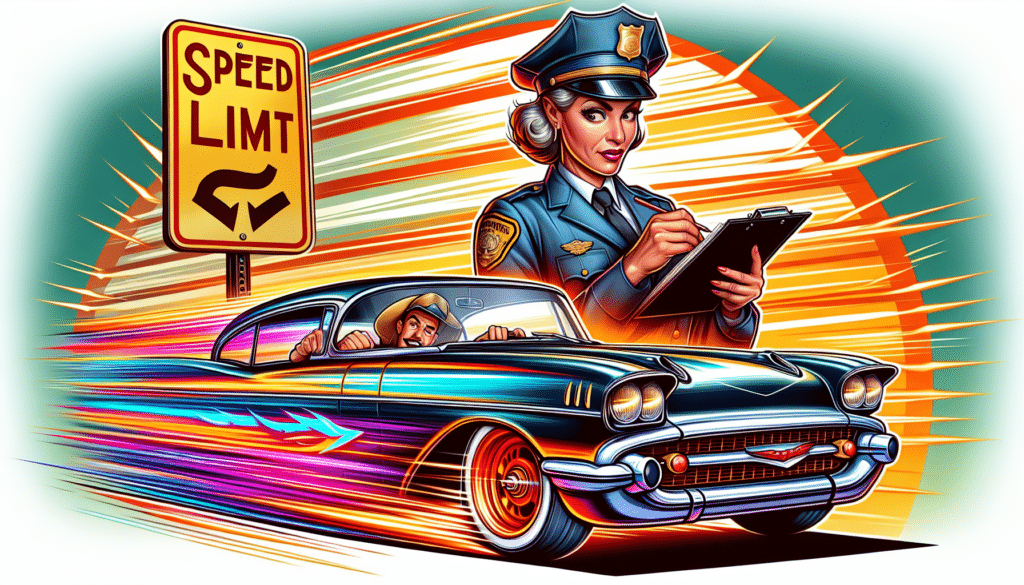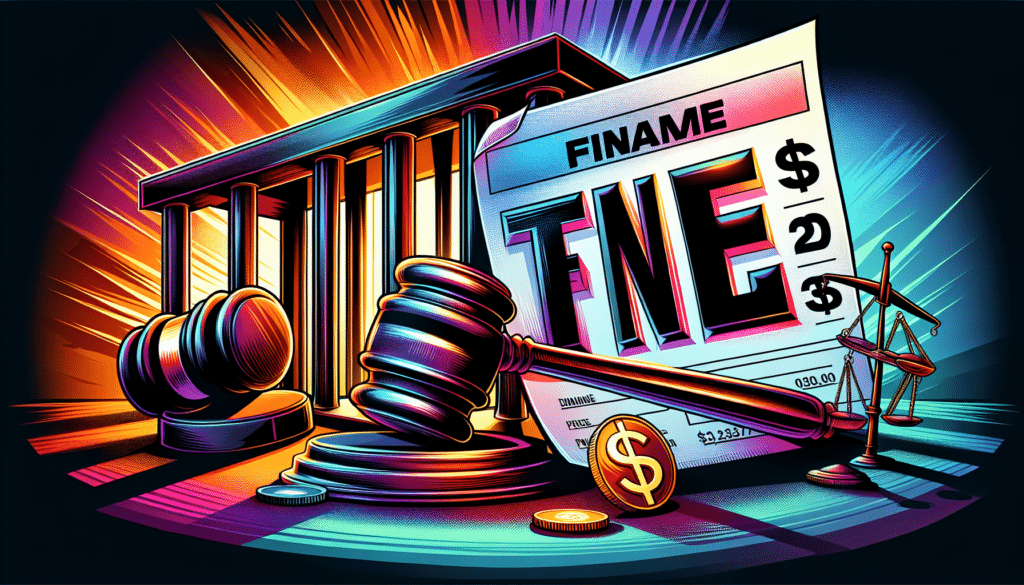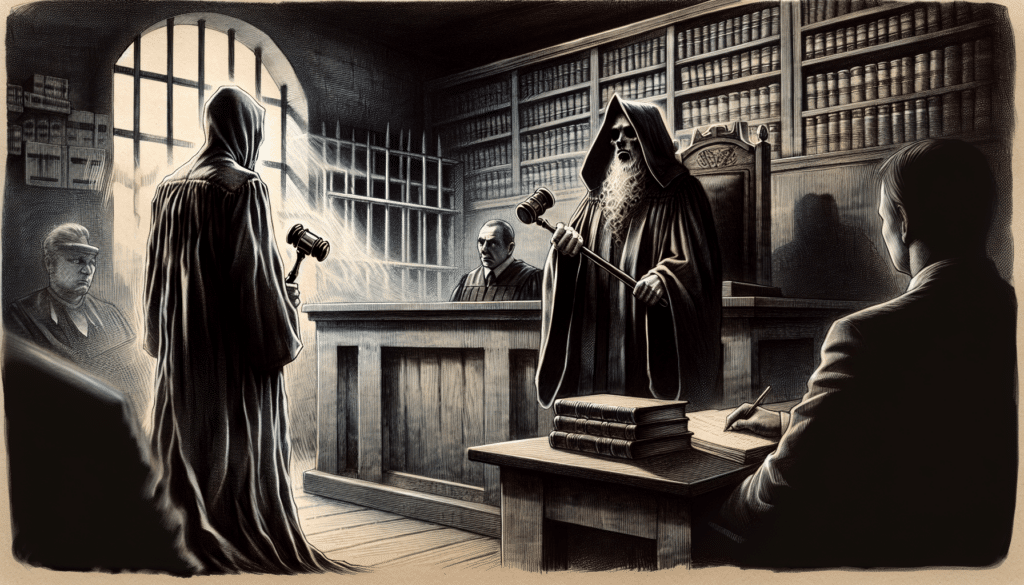Caught speeding 40 over the limit? Worried about fines, legal trouble, or losing your license? This article breaks down the penalties for speeding 40 over, including fines, potential jail time, and how it impacts your record and insurance.
Key Takeaways
Speeding 40 mph over the limit can lead to severe legal consequences, including fines, potential jail time, and license suspension, depending on state laws.
Fines for excessive speeding vary widely by state, typically ranging from $200 to over $1,000, along with points being added to the driving record which can affect insurance rates and driving privileges.
Fighting a speeding ticket involves strategic approaches such as gathering evidence and working with an attorney, as well as understanding the court process and potential penalties like community service or probation.
Legal Consequences of Speeding 40MPH Zone or Over

Exceeding the posted speed limit by 40 mph or more can quickly escalate from a simple traffic violation to a serious legal matter. The consequences of such reckless driving are not to be taken lightly. In many jurisdictions, driving over the speed limit by such a significant margin can lead to severe legal penalties, including potential jail time and the risk of license suspension. The classification of this offense can vary, but it often crosses into the realm of criminal charges, especially when aggravating factors are present.
In states like California, for instance, speeding over 40 mph above the limit is subject to stringent legal penalties. Local laws in various states may classify this degree of speeding as reckless driving, a charge that carries severe penalties such as fines, jail time, and possible license suspension. Reckless driving is considered a major offense because it shows a blatant disregard for road safety and the well-being of others.
Understanding the legal framework in your specific jurisdiction is crucial. Each state has its own set of rules and penalties, but the overarching theme is clear: driving at such excessive speeds is a serious offense with significant consequences. This understanding sets the stage for exploring the various fines and penalties associated with such violations.
Fines and Penalties

When it comes to fines and penalties for speeding 40 mph over the limit, the numbers can be staggering. These fines are designed not only to punish but also to deter such dangerous behavior on the roads. The amount you might have to pay varies widely by state, reflecting differences in local traffic laws and the severity with which each jurisdiction treats excessive speeding.
But fines are just one part of the equation. Penalties can also include points on your driving record, which can have long-term implications for your driving privileges and insurance premiums. Let’s delve into the specifics of these fines and the points system.
Fine Amounts
The fines for exceeding the speed limit by 40 mph are nothing to scoff at. Depending on where you are, you could be looking at fines ranging from $200 to over $1,000. For instance, in California, the fines are determined by local municipalities, which can lead to significant variability. On the other hand, states like Florida have a more structured system where the fine amount increases in proportion to how much the speed limit was exceeded.
These fines are designed to hit hard, serving as a financial wake-up call to those who disregard speed limits. They can cause a serious dent in your wallet, especially when you consider additional court costs and potential surcharges. Paying these fines promptly is crucial to avoid further legal complications.
Points on Record
Receiving a speeding ticket for going 40 mph over the posted limit typically results in a substantial number of points being added to your driving record. In most states, this can mean adding more than 6 points, which puts you dangerously close to the threshold for license suspension.
The points system is a way for states to keep track of habitual offenders. Accumulating too many points within a specific period can lead to severe penalties, including the loss of your driving privileges. This not only impacts your ability to drive legally but also has a ripple effect on your insurance rates and overall driving record.
Impact on Insurance Rates

The impact of a speeding ticket for 40 mph over the limit on your insurance rates is significant. Such a violation typically results in 6 to 8 points being added to your driving record, which insurance companies view as a major red flag. This can lead to a substantial increase in your insurance premiums, sometimes by as much as 25%.
Beyond the immediate financial hit, there are broader implications for your professional life. For those whose jobs require a clean driving record, such as commercial drivers, a single speeding ticket can jeopardize their employment. Employers often conduct background checks that include driving records, and a history of speeding tickets can make securing new employment challenging.
This underscores the importance of understanding and mitigating the consequences of such a serious traffic violation.
Potential Jail Time and Misdemeanor Charges

The possibility of jail time increases with the severity of speeding violations, especially when they involve unsafe driving conditions. In many jurisdictions, excessive speeding can lead to misdemeanor charges if a driver exceeds the speed limit by a significant margin, which varies from state to state. For instance, in Illinois, exceeding the speed limit by 26 to 34 miles per hour can result in a Class B Misdemeanor, carrying a maximum penalty of 6 months imprisonment.
Aggravating factors, such as reckless driving or operating a commercial vehicle, can elevate a speeding violation from an infraction to a misdemeanor. In some cases, aggravated speeding exceeding 35 miles per hour over the limit is classified as a Class A Misdemeanor, with potential penalties including up to 12 months in jail.
These penalties highlight the seriousness with which the law treats high-speed violations.
License Suspension and Revocation
A single speeding violation might not immediately lead to a license suspension, but repeated offenses certainly can. If a driver accumulates multiple speeding violations within a year, they may face a suspension of their driver’s license. Serious offenses such as DUI, vehicular assault, or reckless driving almost always result in license suspension or revocation.
Younger drivers often face stricter rules regarding license suspension. Even minor infractions involving motor vehicles can lead to severe consequences for these drivers, making it crucial for them to adhere strictly to traffic laws.
Understanding the risks can help drivers of all ages navigate the roads more responsibly in a motor vehicle.
Court Process and Supervision
If charged with a misdemeanor for speeding, a driver must usually appear in criminal court rather than traffic court. This process can be daunting, involving multiple court appearances, and often requires legal representation. Supervision is conditional on the offender maintaining a clean driving record for a stipulated period, typically 120 days.
Judges can deny court supervision based on the severity of the offense, the defendant’s driving history, or if the individual has already received supervision multiple times within a year. Commercial drivers face different repercussions; violations will still appear on their driving records, regardless of supervision.
Understanding the court process and the potential for supervision can help in navigating the legal system more effectively.
Reckless Driving Considerations

Reckless driving is characterized by a deliberate disregard for the safety of others, and it does not require proof of actual injury. Specific behaviors, like excessive speeding over 25 mph above the limit, can be classified as reckless driving under many state laws. In California, for example, exceeding the speed limit by 26 mph or more is deemed reckless driving and classified as a Class B misdemeanor.
Ordinary traffic violations can escalate to reckless driving charges if they compromise safety. The perception of reckless driving can vary based on local police culture and whether officers typically attend court for citations.
Judges may consider mitigating circumstances, like emergencies, when determining penalties for speeding offenses. Understanding these considerations can help drivers better appreciate the gravity of their actions on the road.
How to Fight a Speeding 40 Over Ticket
Fighting a speeding ticket for exceeding the speed limit by 40 mph requires a strategic approach. Hiring an attorney can greatly influence the outcome of a speeding ticket case. A free consultation helps individuals understand their legal options and potential outcomes regarding traffic violations. During such consultations, attorneys can outline potential defenses and strategies for contesting the ticket.
Successfully contesting a speeding ticket involves two critical steps: gathering evidence and working with an attorney. Let’s delve into these strategies further.
Gathering Evidence
To contest a speeding ticket effectively, you need to prepare evidence that supports your claim. The burden of proof lies with the prosecution when fighting a speeding ticket. Understanding specific traffic laws and identifying potential errors in the ticketing process can be leveraged in court.
Fighting a speeding ticket involves preparing a solid legal defense and ensuring that your argument is backed by credible evidence. This might include gathering witness statements, photographic evidence, or demonstrating that the posted speed limit signs were not visible.
Working with an Attorney
A traffic ticket attorney can negotiate with prosecutors to potentially reduce charges or have the ticket dismissed. Experienced attorneys can provide guidance on courtroom procedures, improving your chances of a favorable outcome. An attorney with expertise in local traffic laws can provide insights that help formulate an effective defense strategy.
A traffic ticket attorney can negotiate with prosecutors to potentially reduce charges or have the ticket dismissed. Experienced attorneys can provide guidance on courtroom procedures, improving your chances of a favorable outcome. An attorney with expertise in local traffic laws can provide insights that help formulate an effective defense strategy.
Community Service and Probation Options
Penalties for aggravated speeding can include not only jail time and fines but also community service and traffic safety education courses. Judges often mandate community service as a way for offenders to make amends to society for their actions.
Probation may be offered as an alternative to imprisonment, allowing offenders to serve their jail sentence under specific conditions. Conditions of probation often include regular reporting to a probation officer and adhering to legal restrictions. Violating the conditions of probation can lead to a revocation hearing, where the original sentence may be enforced.
Court supervision serves as an alternative sanction for traffic violations, allowing for non-conviction status which does not impact insurance rates.
Long-Term Consequences
A speeding ticket can typically result in a 25% increase in car insurance costs, impacting the annual premium significantly. Average annual premiums for drivers with a speeding ticket can vary widely, depending on the insurer, ranging from $1,693 with State Farm to $4,721 in Michigan.
Beyond financial implications, employers in driving-related fields often conduct background checks on driving records, meaning a speeding ticket can make it challenging to secure new employment. Some employers have strict policies regarding traffic violations, meaning that even a minor infraction like a speeding ticket could result in disciplinary action or job termination.
Free Consultation Services
Many traffic attorneys offer free consultations, which can be a lifesaver for individuals grappling with the complexities of a speeding ticket. During a free consultation, attorneys can provide insights based on their experience with similar cases, which can guide a client’s decision-making. This initial meeting serves as an opportunity to understand the potential outcomes and defenses available, allowing the client to make an informed decision about whether to proceed with legal representation.
Moreover, free consultations help clients assess whether hiring an attorney is necessary based on the specifics of their situation. It’s also a chance for clients to evaluate whether they feel comfortable with the attorney’s approach and expertise. Knowing what to expect from this consultation can ease the stress of facing a speeding ticket and help in planning the next steps.
Summary
In summary, receiving a speeding ticket for going 40 mph over the limit is a serious matter with far-reaching consequences. From steep fines and points on your driving record to potential jail time and increased insurance premiums, the aftermath of such a violation can be daunting. Understanding the legal implications, preparing a strong defense, and possibly seeking the help of an attorney are crucial steps in mitigating these impacts.
The key takeaway is to recognize the gravity of speeding violations and to drive responsibly. If you find yourself facing such charges, knowing your options and being proactive in addressing them can make a significant difference. By following the guidance provided in this blog post, you can navigate this challenging situation with greater confidence and clarity.
Frequently Asked Questions
What are the legal consequences of exceeding the speed limit by 40 mph?
Exceeding the speed limit by 40 mph can result in significant legal repercussions, such as hefty fines, possible jail time, and the suspension of your driver’s license, often categorized as reckless driving. It is crucial to adhere to speed limits to avoid these serious consequences.
How much can I expect to pay in fines for a speeding ticket for 40 mph over the limit?
You can expect to pay fines ranging from $200 to over $1,000 for a speeding ticket for exceeding the limit by 40 mph, depending on your location. It is important to check your local laws for specific amounts.
How does a speeding ticket for 40 mph over the limit affect my insurance rates?
A speeding ticket for 40 mph over the limit typically leads to a substantial increase in your insurance premiums, potentially around 25%, and it may also result in 6 to 8 points being added to your driving record.
Can I go to jail for speeding 40 mph over the limit?
Yes, you can go to jail for speeding 40 mph over the limit, as it may result in misdemeanor charges and potential incarceration, varying by jurisdiction.
What should I do if I want to contest a speeding ticket for 40 mph over the limit?
Contesting a speeding ticket for 40 mph over the limit is best approached by gathering strong evidence and consulting a traffic attorney. This will provide insights into your legal options and potential defenses.




